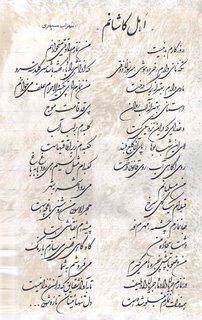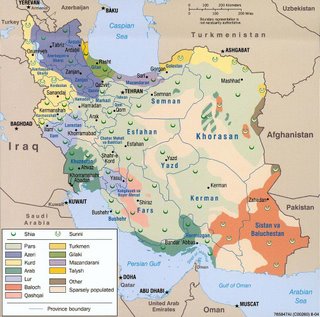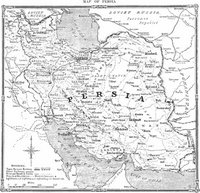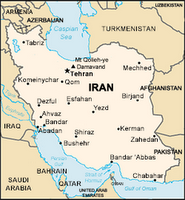Fakhredin Blog
The posts in this weblog are mainly about history, heritage, language, art, and culture of Persia (that is named Iran since 1934). Persia is, therefore, equal to Iran, and Persian is equal to Iranian. Note that Persian is a nationality not an ethnicity. Pars (or Fars) is the major ethnicity in Persia but there are also Persian Kurds or Arabs. Similarly, the official language in Persia is Persian (Farsi is the local name and may not be used internationally). For more details please read my posts.
Saturday, July 29, 2006
Persian: the name of the language
 See this photo? It's a calligraphy of a Persian poem from my favorite poet, Sohrab Sepehri. I'll tell you about him one of these days......
See this photo? It's a calligraphy of a Persian poem from my favorite poet, Sohrab Sepehri. I'll tell you about him one of these days......
But what language is this? It may look like Arabic to some of you, since the alphabet is almost the same. But Persian and Arabic are different languages written with the same alphabet. You can simply think of French and German that almost have the same alphabet but are absolutely not the same.
I use the name "Persian" language. but am I right? Is it the correct name of the language? I can explain it in a simple way. Just look at the sentences below and tell me which group of sentences is correct in your point of view:
Group A:
Group B:
Otherwise, if you think that Group B is the good group, we share the same opinion. Now let me show you the same comparison regarding Persian language:
Group A:
You may hear that many people use the local name of Persian language when they speak English or other Western languages. It's just a mistake that became popular after 1979, when many Persians immigrated to Western countries, and started using the local name. This mistake is now so popular that even Microsoft used the local name of Persian language in its programs! But not everybody made that mistake. Mac OS X (the operating system of Apple computers), for example, worked out all different languages so professionally, and you can see the correct name of the language there.
By the way, I should tell you about my Mac Book Pro! I got it immediately when it came to the market, and I use it almost everyday. And I love it almost every day!
OK, let me finish what I started in this post. Next time, you face somebody using the local name of Persian language, or read it in a newspaper or a magazine, make a comment on that! You can show how professional you are!
 See this photo? It's a calligraphy of a Persian poem from my favorite poet, Sohrab Sepehri. I'll tell you about him one of these days......
See this photo? It's a calligraphy of a Persian poem from my favorite poet, Sohrab Sepehri. I'll tell you about him one of these days......But what language is this? It may look like Arabic to some of you, since the alphabet is almost the same. But Persian and Arabic are different languages written with the same alphabet. You can simply think of French and German that almost have the same alphabet but are absolutely not the same.
I use the name "Persian" language. but am I right? Is it the correct name of the language? I can explain it in a simple way. Just look at the sentences below and tell me which group of sentences is correct in your point of view:
Group A:
- He speaks français
(Il parle French). - She speaks Deutsch
(Sie spricht German). - They speak español
(Hablan Spanish).
Group B:
- He speaks French
(Il parle français). - She speaks German
(Sie spricht Deutsch). - They speak Spanish
(Hablan español).
Otherwise, if you think that Group B is the good group, we share the same opinion. Now let me show you the same comparison regarding Persian language:
Group A:
- I speak فارسی [pronounce: farsi]
(حرف میزنم Persian من [pronounce: mæn pershiën hærf mi-zænæm])
- I speak Persian
( من فارسی حرف میزنم [pronounce: mæn farsi hærf mi-zænæm])
You may hear that many people use the local name of Persian language when they speak English or other Western languages. It's just a mistake that became popular after 1979, when many Persians immigrated to Western countries, and started using the local name. This mistake is now so popular that even Microsoft used the local name of Persian language in its programs! But not everybody made that mistake. Mac OS X (the operating system of Apple computers), for example, worked out all different languages so professionally, and you can see the correct name of the language there.
By the way, I should tell you about my Mac Book Pro! I got it immediately when it came to the market, and I use it almost everyday. And I love it almost every day!
OK, let me finish what I started in this post. Next time, you face somebody using the local name of Persian language, or read it in a newspaper or a magazine, make a comment on that! You can show how professional you are!
Labels: Persian language
Thursday, July 27, 2006
Persian: Nationality or Ethnicity?
 You know that an Irish or a Welsh does not like to be called English. The same situation exists in Persia. Let me explain:
You know that an Irish or a Welsh does not like to be called English. The same situation exists in Persia. Let me explain:
Persia is a large country. Even now that it is in its smallest size in the whole history, it is bigger than Spain, France, and Germany altogether. Due to its large area, many different ethnic groups live there, and they talk also in many different languages.
In the west side of Persia, from north to south, live Azeris (Turks), Kurds, Lurs, and Arabs. In center there are mainly Pars (or Fars that is the Arabized version, since Arabs do not have the sound "p" in their alphabet). In the east live Baloch and Torkmens(1). Every ethnic group has its own language. Persian, which is the language of Pars, is the official language of Persia. The country is called Persia since the royal family of the first Persian Empire was from Pars ethnicity.
Going back to the story of Irish and English people, in Persia also an Arab or a Kurd does not like to be called Pars. Some of those people consider "Persian" to be the English translation of Pars (Fars) ethnicity, and, therefore, insist to keep the name of the country as Iran in order to clarify that not all the people in that land are Pars.
As I explained in the previous post, using the name Iran for the country is not justified. The following proposal may resolve the confusion of the ethnicity:
(1) This list of Persian ethnic groups is not complete.
 You know that an Irish or a Welsh does not like to be called English. The same situation exists in Persia. Let me explain:
You know that an Irish or a Welsh does not like to be called English. The same situation exists in Persia. Let me explain:Persia is a large country. Even now that it is in its smallest size in the whole history, it is bigger than Spain, France, and Germany altogether. Due to its large area, many different ethnic groups live there, and they talk also in many different languages.
In the west side of Persia, from north to south, live Azeris (Turks), Kurds, Lurs, and Arabs. In center there are mainly Pars (or Fars that is the Arabized version, since Arabs do not have the sound "p" in their alphabet). In the east live Baloch and Torkmens(1). Every ethnic group has its own language. Persian, which is the language of Pars, is the official language of Persia. The country is called Persia since the royal family of the first Persian Empire was from Pars ethnicity.
Going back to the story of Irish and English people, in Persia also an Arab or a Kurd does not like to be called Pars. Some of those people consider "Persian" to be the English translation of Pars (Fars) ethnicity, and, therefore, insist to keep the name of the country as Iran in order to clarify that not all the people in that land are Pars.
As I explained in the previous post, using the name Iran for the country is not justified. The following proposal may resolve the confusion of the ethnicity:
- "Persian" is not the English translation of Pars (Fars) ethnicity. The name of an ethnic group is not usually been translated, but is used the same way as in original language. To indicate Pars (or Fars) ethnic group, the exact same word can be used in English.
- Persian means "a person from Persia" not "a person who is Pars." To translate from English to Persian language and vice versa, "Persia" is equal to " ایران " (pronounce: iran), and "Persian" is equal to "ایرانی" (pronounce: irani) not "فارس" (pronounce: fars). There are only two exceptions in translation. "Persian language" is translated "زبان فارسی" (pronounce: zæban-e farsi), and "Persian Gulf" is translate "خلیج فارس" (pronounce: khælij-e fars).
Persian is a nationality not an ethnicity.
(1) This list of Persian ethnic groups is not complete.
Labels: Persian heritage, Persian language
Persia today
You may have noticed that in this blog I use the term "Persia." This may cause a bit of confusion for some people who think Persia is an ancient empire and does not exist anymore. I'd like to explain it in this post.
In ancient times, during the first, second and the third Persian Empires, Persia was very large, covering almost all of the area that we know as the Middle East. Those three empires were the Achaemenid Empire (648–330 BC), Parthian / Sassanid Empire (250 BC– 650 AD), and Safavid Empire (1501–1736). After the Safavid Empire, big pieces of land were detached from Persia in east, north and west (I may explain the role of Russia and Britain in those periods in later posts). By the beginning of 20th century, Persia reached to its smaller size in the whole history (which remained until now).

During all those years (since more than 3000 years ago until the beginning of the 20th century) people inside Persia called their country Iran (Persian: ایران). That is not strange, as German people also call their country Deutschland, while the international name is Germany. Iran, in Persian language, is derived from the word Aryans. In fact, the race of Persian people is Aryan, and they used to have blue/green eyes and blond hair (even today, you may still see few people with that characteristics if you travel to Persia). Dark hair and eyes were dominated in that land after Arabs conquered the second Persian Empire.
In 1935, after Dr. Hjalmar Schacht, the Nazi Economics minister, commented on the Aryan origin of Persians, Persian ambassador in Germany encouraged Reza Shah Pahlavi (who was the king of Persia at that time) to issue a decree asking all foreign delegates to use the word "Iran" (meaning "Aryan") instead of "Persia" in formal correspondence. After the Second World War that led to the defeat of Nazi's, a Persian committee looked into this matter. The committee announced that "changing the name is not justified", so Mohammad Reza Shah Pahlavi (who was then the king of Persia) announced that both "Persia" and "Iran" could be used interchangeably.
I use, therefore, the name Persia throughout this blog for the following reasons:
In ancient times, during the first, second and the third Persian Empires, Persia was very large, covering almost all of the area that we know as the Middle East. Those three empires were the Achaemenid Empire (648–330 BC), Parthian / Sassanid Empire (250 BC– 650 AD), and Safavid Empire (1501–1736). After the Safavid Empire, big pieces of land were detached from Persia in east, north and west (I may explain the role of Russia and Britain in those periods in later posts). By the beginning of 20th century, Persia reached to its smaller size in the whole history (which remained until now).

During all those years (since more than 3000 years ago until the beginning of the 20th century) people inside Persia called their country Iran (Persian: ایران). That is not strange, as German people also call their country Deutschland, while the international name is Germany. Iran, in Persian language, is derived from the word Aryans. In fact, the race of Persian people is Aryan, and they used to have blue/green eyes and blond hair (even today, you may still see few people with that characteristics if you travel to Persia). Dark hair and eyes were dominated in that land after Arabs conquered the second Persian Empire.

In 1935, after Dr. Hjalmar Schacht, the Nazi Economics minister, commented on the Aryan origin of Persians, Persian ambassador in Germany encouraged Reza Shah Pahlavi (who was the king of Persia at that time) to issue a decree asking all foreign delegates to use the word "Iran" (meaning "Aryan") instead of "Persia" in formal correspondence. After the Second World War that led to the defeat of Nazi's, a Persian committee looked into this matter. The committee announced that "changing the name is not justified", so Mohammad Reza Shah Pahlavi (who was then the king of Persia) announced that both "Persia" and "Iran" could be used interchangeably.
I use, therefore, the name Persia throughout this blog for the following reasons:
- The decision on changing the name was politically motivated, and (happily) with the removal of Nazi's we don't need to keep it. Actually, there is no reason to use local name of a country in international conversations. It is just like using the name Deutschland in English conversation.
- The name Iran causes many people to confuse it with Iraq (an Arab state west of Persia). In fact, during the Second World War, Winston Churchill ordered to always use the name Persia in brackets in front of the name Iran to prevent such confusion during military actions.
- The act of changing the name brought cultural damage to the country and separated it from its past from the point of view of Westerns. I give you one example:
The word Persia immediately reminds us of the land which Persian cat, Persian carpet, Persian pistachio, and Persian caviar come from. It also reminds us of Persian language, Persian poetry, Persian mysticism, Persian miniature, and famous Persian scientists. It holds on to the name of Persian Empires, Persian Gulf, and many other historical issues. An entity with the name Iran has none of those capacities (at least not in the point of view of Western people).
Labels: Persian heritage, Persian history
Tuesday, July 25, 2006
My first post in English
This is the first post I am putting on this page. You may ask why an English page for Fakhredin Blog was needed. The truth is that I have received a serious comment that why I wrote the whole blog in Persian language. The issue was actually about my aim of having a blog. I started the Persian page of Fakhredin Blog in March 2004. My main aim was to write about the issues which I find interesting in daily life. In practice, most of the posts ended up to be about Persian history and Persian culture. I became more and more interested in World Heritage, and the role of Persia in it. This leaded me to the discussion of tourism industry in Persia, what has been done, and what is not still OK. I noted several times that we live in an era in which "information" is the key for any progress.
As you see, talking about information, it was not just to limit my blog to Persian readers. In fact, I realized that most of those information regarding Persian history or heritage is already well known for Persians themselves. If we, as Persians, do or do not appreciate that is another story. Nonetheless, it is of extreme importance to open those discussions to a broader audience. Let me give you an example:
You may recall the act of National Geography Society regarding the name of Persian Gulf, and the consequent reactions which forced the Society to withdraw. We all know that it was not the beginning, nor the end, of such matter. The conflict about the name of Persian Gulf is continuing very seriously. Several exhibitions and conferences are organized in Persia, but unfortunately the audiences were only Persian people. As Pejman Akbarzadeh noted several times in his articles in Shargh Newspaper: Persian people already agree! We do not need to convince them!! We need international act for this issue. You may like to read this article by Pejman in Shargh Newspaper (it's in Persian language).
Similar disputes are currently ongoing regarding Persian poets and Persian scientists. Certain people are claiming that some Persian poets/scientists were Turkish or Arab. I will try to discuss this matter in detail later. In short, you can just imagine if Germans start claiming Van Gogh to be a German painter, and not Dutch!
For this reason, and many others, I decided that an English page is of importance. I hope I will continue posting in both languages, and I look forward for many comments from you.
Deo Volente!
As you see, talking about information, it was not just to limit my blog to Persian readers. In fact, I realized that most of those information regarding Persian history or heritage is already well known for Persians themselves. If we, as Persians, do or do not appreciate that is another story. Nonetheless, it is of extreme importance to open those discussions to a broader audience. Let me give you an example:
You may recall the act of National Geography Society regarding the name of Persian Gulf, and the consequent reactions which forced the Society to withdraw. We all know that it was not the beginning, nor the end, of such matter. The conflict about the name of Persian Gulf is continuing very seriously. Several exhibitions and conferences are organized in Persia, but unfortunately the audiences were only Persian people. As Pejman Akbarzadeh noted several times in his articles in Shargh Newspaper: Persian people already agree! We do not need to convince them!! We need international act for this issue. You may like to read this article by Pejman in Shargh Newspaper (it's in Persian language).
Similar disputes are currently ongoing regarding Persian poets and Persian scientists. Certain people are claiming that some Persian poets/scientists were Turkish or Arab. I will try to discuss this matter in detail later. In short, you can just imagine if Germans start claiming Van Gogh to be a German painter, and not Dutch!
For this reason, and many others, I decided that an English page is of importance. I hope I will continue posting in both languages, and I look forward for many comments from you.
Deo Volente!
Labels: General

